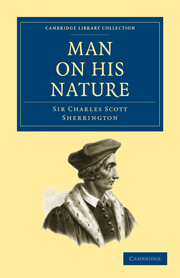Book contents
- Frontmatter
- Preface
- Contents
- Illustrations
- I Nature and Tradition
- II The Natural and Superstition
- III Life in Little
- IV The Wisdom of the Body
- V Earth's Reshuffling
- VI A Whole Presupposed of its Parts
- VII The Brain and its Work
- VIII The Organ of Liaison
- IX Brain Collaborates with Psyche
- X Earth's Alchemy
- XI Two Ways of one Mind
- XII Conflict with Nature
- Index
V - Earth's Reshuffling
Published online by Cambridge University Press: 07 September 2010
- Frontmatter
- Preface
- Contents
- Illustrations
- I Nature and Tradition
- II The Natural and Superstition
- III Life in Little
- IV The Wisdom of the Body
- V Earth's Reshuffling
- VI A Whole Presupposed of its Parts
- VII The Brain and its Work
- VIII The Organ of Liaison
- IX Brain Collaborates with Psyche
- X Earth's Alchemy
- XI Two Ways of one Mind
- XII Conflict with Nature
- Index
Summary
…the course of nature…seems delighted with transmutations.
Newton, Query 30, Opticks.The early lilies became part of this child,
And grass, and white and red morning-glories, and white and red clover, and the song of the phoehe-hird,
And the fish suspending themselves so curiously below there—and the beautiful curious liquid,
And the water-plants with their graceful flat heads—all became part of him.
Walt Whitman, Assimilation.I deem I was not made for heaven or hell
But simply for the Earth.
W. Morris, Bellerophon at Argos.There are words which some turn in the history of thought suddenly overwhelms with a large special meaning. Such a one is evolution. We might prefer to qualify it as ‘biological evolution’, were it not that, scientifically speaking, the distinction between ‘living’ and ‘lifeless’ seems somewhat strained. The special connotation attaching to evolution implies that types of living things have, like human affairs, a history which can be traced, and that when traced their history bears witness to a progressive change whereby what they are is different from what they were. New types, the expression runs, have been’ evolved’. In the course of their history, in many cases more complex types have evolved from less complex. And that aspect of evolution is of particular interest to ourselves because we ourselves seem to be among its instances. We seem an outstanding example of it.
- Type
- Chapter
- Information
- Man on his Nature , pp. 137 - 170Publisher: Cambridge University PressPrint publication year: 2009First published in: 1940



